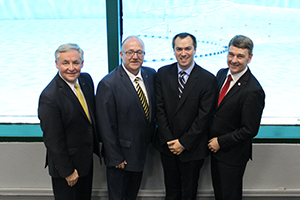News
Tuesday, October 27, 2015

The Provincial Government continues to support the province’s fishing industry by funding leading-edge fisheries science initiatives through the Marine Institute’s Centre for Fisheries Ecosystems Research (CFER). The Honourable Vaughn Granter, Minister of Fisheries and Aquaculture, announced $2.6 million to enable CFER to continue its operations and research activities, including the charter of an offshore fisheries research vessel, at the Marine Institute this morning. Minister Granter was joined by Carey Bonnell, Head, School of Fisheries, Fisheries and Marine Institute and Dr. Peter Heffernan, CEO, Marine Institute (Ireland).
“Funding our own research allows us to expand the fisheries science knowledge base by applying new technologies to complement more traditional surveys conducted by the federal Department of Fisheries and Oceans. It also helps Memorial University and its Marine Institute to develop the human resource capacity necessary to engage in research of interest to our commercial fisheries sector. Enhancing our understanding of fisheries ecosystems helps to inform decision-making and better prepare our industry for the fishery of the future.”
- The Honourable Vaughn Granter, Minister of Fisheries and Aquaculture
Newfoundland and Labrador remains the only province in Canada to solely fund its own offshore fisheries research. The funding being provided to CFER for 2016-17 will allow it to charter the Irish Marine Institute’s state-of-the-art fisheries research vessel, RV Celtic Explorer, for a sixth consecutive year to support its continued research and focus on surveys, stock assessments and sustainable fisheries; ecosystems structure and change, climate and fisheries influences; and, species biology, ecology and behaviour.
“Fisheries research is the key to unlocking our understanding of changing ocean dynamics and contributing to the continued economic growth and success of our fishery. In just five short years, CFER has undertaken a wide variety of fisheries research, with the support of the Provincial Government that bears directly on the future of the fisheries and fishing communities of Newfoundland and Labrador and indeed, those worldwide.”
- Glenn Blackwood, vice-president, Memorial University (Marine Institute)
With this funding, CFER will continue to build on its world-class research for commercially relevant species off Newfoundland and Labrador and advance its work in training the next generation of fisheries scientists.
In 2016, CFER will conduct a 22-day survey in the waters of the North Atlantic adjacent to the province, focusing on critical research questions to support the Newfoundland and Labrador fishing industry. CFER scientists will focus their studies on the changing ecosystem and warming water temperatures in collaboration with scientists from Memorial University, the federal Department of Fisheries and Oceans and with stakeholders in the local fishing industry.
The transatlantic crossing of the vessel will also allow the Marine Institute to continue its work with the Atlantic Ocean Research Alliance to map the seafloor between St. John’s, Newfoundland and Labrador, Canada and Galway, Ireland.
“We’re delighted to continue this partnership with our colleagues at CFER to carry out important fisheries research in Newfoundland and Labrador. We place huge value on this charter by CFER, and through it, we’ve developed strong collaborations on transatlantic ocean research. Earlier this year we carried out the first transatlantic seabed mapping survey under the Atlantic Ocean Research Alliance on the RV Celtic Explorer, and this was directly facilitated by the 2015 charter by CFER. We’re very excited about opportunities to expand the scale and impact of the transect mapping with our Atlantic Ocean Research Alliance partners in 2016.”
- Dr. Peter Heffernan, CEO Marine Institute (Ireland)
In May 2015 CFER presented a five-year report providing a spotlight on the researchers, students and technologists and the innovative research it has conducted since 2010.





